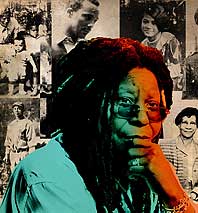
“Authenticity,” we were told by Henry Louis Gates Jr. in his 1997 book Thirteen Ways of Looking at a Black Man, “is among the founding lies of the modern age.” Gates, the chair of the Department of African and African American Studies at Harvard, didn’t spell out exactly what he meant by authenticity in his essays on James Baldwin, Harry Belafonte, Bill T. Jones, Louis Farrakhan, O. J. Simpson, and Colin Powell. But none of these men had been permitted merely to be themselves; each had grown up with “the burden of representation,” shadowed by the fact that his actions would either “honor” or “betray” the race. And Gates was equally impatient with the construction of “race,” whether from pieces of paper (legislation, covenants, certificates of birth, and similar cards of identity) or from fantasy (the black body eroticized, demonized, merchandised, or lynched).
On the other hand, as we learned in his 1999 BBC-PBS mini-series Wonders of the African World, “Skip” Gates, from his West Virginia childhood on, loved the barbershop stories of Africa—a queen of Sheba, the megaliths of Kerma, black pharaohs and pyramids in the Sudanese Sahara. He liked to think of himself as Nubian. Imagine his consternation on discovering in the fourth hour of his new documentary, the fascinating and provocative African American Lives, that, according to the best available DNA evidence, he is not only 50 percent sub-Saharan African and 50 percent European, but that the European half seems to track back to Ireland (indentured servitude?). Maybe, he says to his Harvard students, he will have to quit as chair of his own department.
In African American Lives, Gates sits down to chat up Oprah Winfrey, Chris Tucker, Whoopi Goldberg, Quincy Jones, neurosurgeon Ben Carson, astronaut Mae Jemison, evangelical bishop T. D. Jakes, and sociologist Sara Lawrence-Lightfoot. But he has also traced them back by photographs, court records, genealogy and gene sequencing, past parents, grandparents, Reconstruction, Civil War, and Middle Passage to roots they didn’t know they had. Winfrey, whose own childhood story is much scarier than anything to be found in James Frey’s fictitious memoir, is not a bit surprised to learn that she’s zero percent European, but Lawrence-Lightfoot is amazed—not that she’s 45 percent European, but that she isn’t even a smidgen Native American. Quincy Jones is 34 percent European, whereas Whoopi Goldberg is 92 percent African. Gates accompanies Chris Tucker across the Atlantic to Angola, where Tucker’s ancestors had been sold by the Portuguese into slavery. The look on Tucker’s face at a village dance in southwest Africa is one of the reasons television was worth inventing.
In fact, the average African-American is 20 percent European. So much for representation, identity, and authenticity. And yet, as Lawrence-Lightfoot tells us, all these accomplished people have now chosen their culture, no matter what their chromosomes remember or regret. And Skip Gates, who is obliged to hobble through this mini-series on a broken foot, getting on airplanes and out of slave ports with the help of crutches, has once again covered so much territory, both geographical and intellectual, that by the end he seems to have warp-factored light-years.
February traditionally brings both bad new sitcoms and good new documentaries. Here are three worth your serious attention: Grizzly Man (Discovery Channel, February 3, 8 p.m.), the first TV broadcast of Werner Herzog’s eerie and agonizing account of the death of Timothy Treadwell in the Alaskan wilderness in 2003; Arna’s Children (Sundance, February 6, 9 p.m.), in which Israeli actor-director Juliano Mer-Khamis explores the work his activist mother, Arna Mer, did with a children’s-theater group among Palestinian refugees in Jenin; and Little Otik (Sundance, February 7, 9 p.m.), the U.S. premiere of filmmaker Jan Svankmajer’s surreal rendition of a Czech fairy tale about babies carved out of tree trunks.
African American Lives. PBS. Wednesdays, February 1 and 8, 9 p.m.